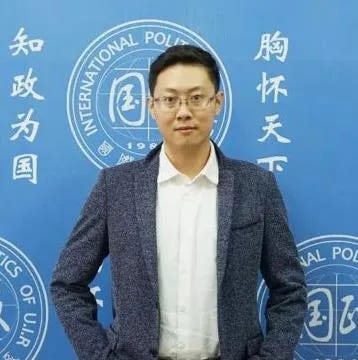As the U.S. and Canada are investigating three unidentified flying objects (UFOs) shot down over North America in the past three days, here are some commentaries from selective China's academics and think-tanks.
The first article from Shen is produced partially in full whereas the others (to scroll down) are excerpts from Thomas des Garets Geddes’ Sinification substack site.
[ A 5-minute read ]
“It is common knowledge that balloons themselves do not have (or have only limited) motive power controls and that there is no way to control the direction of their movement significantly. They can only move according to the direction of the wind.”
“This raises a question pertaining to international law. According to international law, the scope of a country's sovereignty, in a spatial sense, includes its land, territorial waters and airspace (the exact boundaries of this ‘airspace' are, of course, still disputed). If an airborne device from one country enters the airspace of another without its permission, then the latter can, in theory, directly shoot it down. However, according to normal international practice, if the airborne device entering this airspace is neither intending to trespass nor harmful in any way, then a low-key approach to handling [the situation] is generally preferred.”
“During this balloon incident, the US's approach has been to shoot down the balloon and have the Department of Defense issue a clear statement claiming that this was not the first time that a Chinese balloon had entered US airspace and that similar incidents had occurred at least three times during the previous administration … If similar balloon incidents did really occur then, how could ‘King Know-all’ [‘懂王’, i.e. Trump] have chosen to resolve them quietly rather than making this very public? So far, there is still not enough information available to be able to pass judgement.”
“I have consulted a number of relevant people and, according to them, the following points can at least be ascertained in this incident:”
“[First,] despite its use of the term 'spy balloon', the US has acknowledged that the balloon itself posed no threat to [people on] the ground [不会对地面构成什么威胁] and was not offensive in nature. [It said so,] both in the report issued by the Pentagon and in its answers to questions from journalists.”
“Second, the claim that 'the balloon was used to gather intelligence' is absurd and laughable … Even if it had really been a 'spy balloon', the US would not necessarily have needed to shoot it down.”
“The reason why the US is making such a big fuss about it is essentially [because this matter] has been politicised. Against a backdrop of increasingly polarised politics in the US, with both parties even more divided and the government under heavy pressure ahead of the 2024 presidential election, this weak government has very little capacity to respond to such unexpected events and it has no other choice but to conform to the most overpowering populist ideas.”
“The US is acting in the name of 'international law', but every time I see the US claim to be 'defending international law, defending US territorial integrity and sovereignty', I feel a sense of preposterous temporal and spatial disorder. The US, being a 'case law' country, is trying to establish a new international practice: ‘shoot down anything that enters my airspace, no matter what the other side's explanation is.’ This is not a good trend.”
“Today's situation is partly due to the lack of strategic trust [战略信任的缺失] between the US and China. But at a deeper and more fundamental level it is due to the continued polarisation of US domestic politics and the resulting deterioration of the [US’s] political ecology.”
“In an increasingly vile political environment, the space required by governments for effective cooperation and coordination when dealing with diplomatic and national security matters is shrinking.”
“If Blinken had insisted on not cancelling or not postponing his visit to China, he would have been labelled as ‘capitulating', ‘pro-China' and ‘pro-CCP' by the extreme right. His own political reputation would have been seriously affected.”
“Following the shoot-down of the balloon, follow-up work such as hearings, the release of information and the recovery and analysis of the debris will continue. The attempts by the US to use this issue to smear China will not stop here.”
“From now on and for the foreseeable future, unless major and conspicuous changes to the US's domestic political landscape take place, it will be very difficult for US-China relations to return to a positive and healthy development path. The US should be held primarily responsible for this.”
Author: Zheng Yongnian (郑永年) – Director of the Institute for International Affairs, Chinese University of Hong Kong.
Published: Friday 10 February 2023
Source: GBA Review
Summary:
· Domestic issues in the US and the polarisation of American politics in recent years are the main drivers behind the recent spiralling of tensions over this balloon.
· With both the Republicans and Democrats competing to see who can be tougher on China, improving US-China relations will be difficult.
· The future of US-China relations now depends primarily on China. Beijing should:
Not act impulsively in the face of provocations by US China hawks.
Focus on the overall picture of US-China relations and on fostering cooperation with Washington.
Aim for “healthy” economic and technological competition with Washington, not military competition.
Adopt a “I will wrestle with you, but our relationship will not break” type of approach.
Focus on China’s economic development and the opening up of China’s economy, regardless of what others decide to do. Only by doing so will Beijing be able to avert unrest at home, slow down the US’s push to decouple from the PRC and, in so doing, have a chance of stabilising its relations with Washington.
Author: Zhu Feng (朱锋) – Director of the School of International Studies, Nanjing University.
Published: Tuesday 7 February 2023
Source: Phoenix
Summary:
· The balloon incident has been blown out of proportion for three reasons: 1. It was exposed by the US media; 2. It is being manipulated by China hawks; 3. It is being amplified by the “China threat” paranoia of the American population as a whole.
· Similar airborne devices have previously entered both US and Chinese airspaces without their causing such a stir. The US has overreacted despite public and private attempts by Beijing to resolve this issue.
· The greater the polarisation of US politics and US society as a whole, the more politicians will attempt to use the “China threat” theory as a rallying point. This trend has been the main driver behind the growing tensions between Beijing and Washington and will continue to pose the greatest threat to US-China relations in coming years.
· If anti-China sentiment is left unchecked in America, US-China relations risk becoming confrontational.
· The risk of US-China confrontation will be exacerbated if the analysis of the balloon were to confirm its intent to spy on America. If such conclusions were to be made, US pressure on China would undoubtedly increase, which would probably have a spill-over effect on Beijing’s biggest potential flashpoint with Washington – Taiwan.
· General Mike Minihan’s recent prediction of an imminent US-China war reflects the US military's desire for military conflict or at least preparation for one.
· US-China “guardrails” are crucial to averting future crises but cannot be defined by Washington alone. The US’s intent on changing the status quo vis-à-vis Taiwan is currently unacceptable.
· China should no longer have any illusions about Washington’s intent to "restrain China, weaken China and hurt China". This poses the gravest threat to China’s rise that the country has so far encountered. However, Washington does not wish to completely break away from China.
· Beijing should continue to use “actions and facts” to warn the US against hegemonic behaviour.
· Beijing should continue to say no to decoupling and no to a cold war with Washington.
· Beijing should not allow individual US politicians to hijack the overall US-China relationship.
· China should continue to reform and open up, continue to deepen its ties with the world and should recognise that whoever leads the way in technological innovation and industrialisation is bound to win the overall great power game.
Author: Wang Haili (王海利), a retired PLA Air Force colonel and now a senior researcher at Taihe Institute, a Beijing-based think tank.
Published: Tuesday 7 February 2023
Source: Taihe Institute
Summary:
· Some balloons carry equipment capable of transmitting signals via both military satellites and channels designed for civilian use. Such balloons can therefore be considered as both military and civilian in nature. The US is sure to use this ambiguity against China.
· The US must have known about the existence of this balloon a long time before it was made public.
· Washington probably revealed and hyped up its existence to achieve two political objectives:
Gain the upper hand in its exchanges with Beijing by fostering an atmosphere in which China would feel enough “guilt” [愧疚感] and pressure for it to become more amenable to the US.
Divert people’s attention away from potential compromises with Russia over Ukraine.
· Were the US to confirm the malicious intent of this balloon, anti-China sentiment would rise in the US, leading to more anti-China legislation and to the US military increasing its defensive and offensive measures against China.
· Continued engagement with the US is crucial but “the ball is now in the US's court” to suggest when and how such contacts should take place.
Author: Sun Bingyan (孙冰岩) – Lecturer at Peking University’s School of International Studies. US politics and diplomacy specialist.
Published: Monday 6 February 2023
Source: Phoenix
Summary:
· The US Department of Defense had long been aware of the existence of this balloon. Washington had no need to expose this incident in such a high-profile manner and should have endeavoured to resolve this discreetly with Beijing.
· Whether or not this incident will lead to a continued worsening of US-China relations in 2023 now depends on the US’s next moves. Washington could still frame this as an isolated incident and just let it blow over.
· There is also a risk that the Biden administration will succumb to pressure from the Republicans to adopt an even tougher response to this incident.
· Anti-China sentiment among the general US public is another factor that could affect the government’s approach to this affair. This is the US’s own making. In recent years, Washington has been using the US media to hype up the threat that China poses to America’s national security. It now has to respond to such domestic pressure.
· This balloon incident may well continue to fester in the coming months and will be used as a further way of attacking China.







